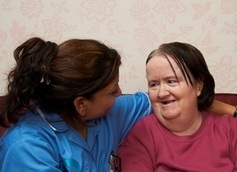'Significant barriers' stop people with learning disabilities using slimming clubs
People with mild to moderate learning disabilities are more likely to be obese and have poorer health than the general population, yet they face significant barriers in accessing commercial slimming clubs.

Researchers from Sheffield University found that people with mild to moderate learning disabilities are often not even aware of the existence of weight loss clubs such as Slimming World and often rely on carers and personal assistants to take them out and therefore may not have access to the support to help them go. Those that have managed to enquire about joining may find diet plans and general weight loss materials too complicated and hard to follow.
The study called ‘WiLD: Weight Loss for Learning Disabilities’, which is currently underway, is looking at how slimming clubs can be made more accessible to people with learning difficulties.
Dr Liz Croot, from the University’s School of Health and Related Research (ScHARR), who is leading the project, alongside research assistant Melanie Rimmer, said: “Our findings so far indicate that people with learning disabilities have a great deal of knowledge about healthy eating. But like the rest of us, they can find it difficult to put that knowledge into practice.
“They’ve told us the most important thing when trying to change your lifestyle is support from someone who understands you. That’s where a peer-support group, like a slimming club, can be much more effective than simply giving them information, such as leaflets or recipes.”
The next stage of the research project, will involve a national survey on the Slimming World website to recruit any members who have learning disabilities, as well as leaders or ‘consultants’ who have already run groups which included members with learning disabilities. A sample of these participants will be interviewed to find out what aspects of the intervention work well for them, and what can be modified to make it more accessible and relevant for people with learning disabilities.
Guided by a steering group which is made up of people with learning disabilities, the study will see the steering group advise on matters such as development of Easy Read participant information documents and consent forms. They will also advise on the structure and format of focus groups and interviews.
The project hopes to identify what exactly will allow greater access to, and benefit from, mainstream commercial slimming clubs for people with learning disabilities.
The researchers hope that some of their findings will be transferable to other mainstream commercial health and fitness activities, such as gyms and yoga classes.
“People with mild to moderate learning disabilities are more likely to be obese than people in the general population, and they have much poorer health outcomes,” said Dr Croot.
“Improving their access to mainstream groups and services is a disability rights issue. And improving their access to health and fitness groups is a public health issue.”
The study is being funded by the Medical Research Council (MRC).
To find out more about the study, entitled WiLD: Weight Loss for Learning Disabilities (Helping People with Learning Disabilities Go To Slimming Clubs if they Want To), visit: http://wild.group.shef.ac.uk/
You can follow the project Twitter feed at @WILD_ScHARR
Latest News
 29-Jul-24
Dementia Bus gives carehome.co.uk staff insight into life with dementia
29-Jul-24
Dementia Bus gives carehome.co.uk staff insight into life with dementia
 01-Mar-24
Find out the top care homes in 2024
01-Mar-24
Find out the top care homes in 2024
 21-Mar-23
UK's top care homes in 2023 revealed
21-Mar-23
UK's top care homes in 2023 revealed
 03-Jan-23
carehome.co.uk launches free care helpline
03-Jan-23
carehome.co.uk launches free care helpline
 13-Dec-22
5 mins with Emily Whitehurst, chief operating officer for Constantia Healthcare
13-Dec-22
5 mins with Emily Whitehurst, chief operating officer for Constantia Healthcare